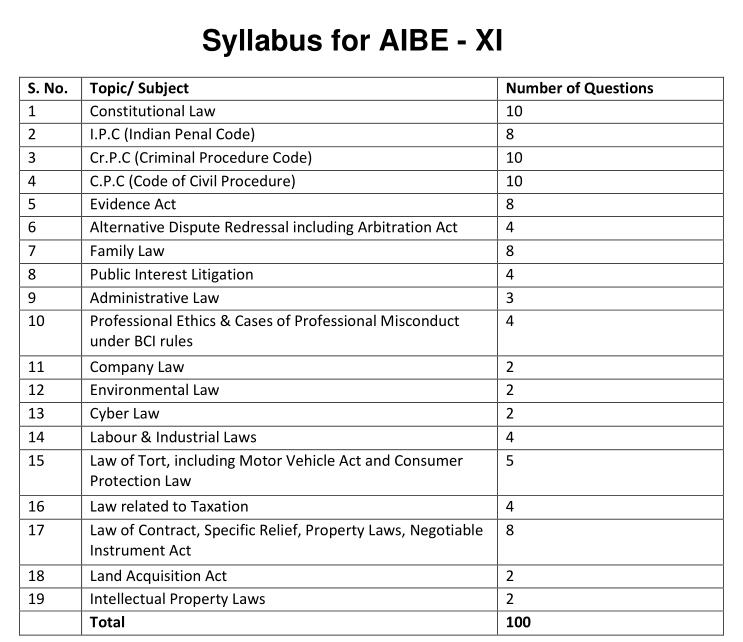
In a welcome move at transparency, the Bar Council of India (BCI) has (perhaps for the first time ever) released the English language questions and answer keys to the 11th All India Bar Exam (AIBE) that took place last weekend, on 3 December.
Even if you have never taken the AIBE and even if you'll never be taking the AIBE, it could be interesting (if you're a lawyer) to browse the 100 questions to evaluate the difficulty level.
Just on a cursory skim read, several questions in this open book exam appear to be ambiguous or trivia that will be mostly irrelevant to legal practice.
You can also help spot any mistakes in the answer key provided.
We have (hopefully) helpfully marked in red the correct answers on a PDF (as supplied by the BCI) for the question-answer set A (other question sets and answer keys available below via the AIBE website).
But pointless or potentially wrong questions aside, some of the AIBE questions could theoretically help in weeding out advocates who have not learned anything during their law degrees (or who have only got paper degrees from fake law colleges that the BCI has accredited).
But for that to happen, the BCI needs to at the very least display far greater transparency in its conduct of the AIBE, including break-downs of fail and pass rates per state (as had been done in the very earliest AIBEs), while continuing to publish answer keys.
Some pointless / confusing questions?
Take for example, set A's question 95:
“The term ‘Tort’ is a
(a) Latin Word,
(b) French Word,
(c) English word,
(d) Italian word” (sic in random capitalisations of ‘word').
The correct answer, according to the BCI, is that tort is a French word. Well, without wanting to be a stickler for detail, tort is both a French and English word, though if the question intends candidates to answer the origin of the word 'tort', then (according to Merriam-Webster) it could either be from French, Middle English or from the Medieval Latin tortum. In either case, apart from being a rather bad and confusing multiple choice question, it does make you wonder: will Indian clients ever care whether their lawyer knows about the etymology of tort?
And since the exam is being carried out in 11 languages, is such a question discriminatory against those not fluent in English (or French)?
Another similarly pointless pseudo-etymology question (15 in set A) asks candidates to answer whether the word “ombudsman” is “derived from” French, British, Swedish or German administration. Again, what difference does it make in everyday lawyering in India to know that Wikipedia says that “use of the term in modern times began in Sweden, with the Swedish Parliamentary Ombudsman instituted by the Instrument of Government of 1809”, coming from the Old Norse word umboðsmaðr?
In the absence of the BCI providing any required reading list (other than the vague syllabus screenshotted above) or preparation materials to candidates, these two questions boil down to trivia and really raise the question of why they were included.
Now, I'm not an Indian-qualified lawyer, so please correct me if I'm wrong, but another bad question appears to be set A's question 8:
“Temporary Injunction can be granted
(a) Suo moto (sic)
(b) Ex parte
(c) Hearing both parties
(d) None of the above
Apparently, the correct answer is “ex parte”. But surely, the power of an Indian court to grant temporary injunction exists not just when hearing only one party, but can also be passed by a court when hearing both parties (or in rare cases also suo motu).
There may very well be some other bad or incorrect question - please have a look and let us know in the comments - we will be happy to forward any objections that there's a consensus on to the below email address, as specified on the AIBE website:
“Candidates are advised to go through the Question papers and the Answer keys for AIBE-XI, conducted on 3.12.2017. Objections, if any, are invited on , within the next 10 working days, i.e, 15th December, 2017, till 5 PM, after which no claim will be entertained whatsoever, and results will be declared based on the Answer keys as uploaded.”
threads most popular
thread most upvoted
comment newest
first oldest
first
Question 72 of Set A
Which of the following is not of civil nature-
Refer options above..
Correct answer as per BCI is Option C
But it just doesn't makes any sense..
All the options are of Civil Nature
The question is completely wrong and vague...
This must be highlighted to BCI immediately
2. There were some questions in (set A) that were confusing as well as wrong quoted.
3. Question number 61 was asked as :-
"Which is the authority that determines the language of the court other than High Court within a given State, under Section 271of Cr.PC".
But sir/madam "Section 272" of Cr.PC determine the authority which determines the authority of the "State Government" to determine language of court other than High Court.
4. Question number 100 states that :-
"Income is defined under Section 24 of the Income Tax Act, as"
But sir/madam Section 24 of Income Tax Act does not define 'Income' Section 24 of the Income Tax Act defines 'Income from House Property'.
I am making a list of such questions n answers, post them here and will soon voice my concern.
Meanwhile wish me good luck for my exams.
threads most popular
thread most upvoted
comment newest
first oldest
first